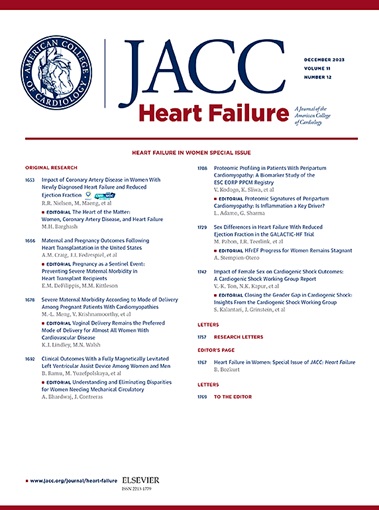转甲状腺素 V142I 携带者的心血管风险因素和遗传风险。
IF 11.8
1区 医学
Q1 CARDIAC & CARDIOVASCULAR SYSTEMS
引用次数: 0
摘要
背景:在美国,近 3% 至 4% 的黑人携带转甲状腺素 V142I 变异,这会增加他们患心力衰竭的风险。然而,心血管(CV)风险因素(RFs)对 V142I 变异携带者临床结局风险的影响尚不清楚:本研究旨在评估心血管风险因素对 V142I 基因变异携带者心衰风险的影响:本研究纳入了来自 6 个 TOPMed(Trans-Omics for Precision Medicine)队列、REGARDS(Reasons for Geographic And Racial Differences in Stroke)研究和 All of Us Research Program 的无流行性心衰的自认黑人。根据 V142I 基因型和 CV RFs(高血压、糖尿病、肥胖和高胆固醇血症)的数量对队列进行了分层。使用调整后的 Cox 模型评估心力衰竭与 V142I 基因型和心血管射频特征的关系,并以心血管射频特征良好的非携带者作为参照:横断面分析(包括 48 365 名黑人中的 1 625 名 V142I 携带者)发现,心血管射频的患病率并不因 V142I 携带者的身份而异。在纵向分析中,18 407 名黑人中有 587 名(3.2%)V142I 携带者(中位年龄:60 岁 [Q1-Q3:52-68 岁],63.0% 为女性)。在携带者中,有利的(0 或 1 RF)CV RF 特征(调整后 HR:2.26;95% CI:1.58-3.23)与不利的(3 或 4 RFs)CV RF 特征(调整后 HR:4.14;95% CI:2.79-6.14)相比,心衰风险有所降低:结论:良好的心血管射频谱可降低但不能消除 V142I 变异相关的心力衰竭风险。这项研究强调了在 V142I 基因携带者中建立良好的心血管射频谱对降低心衰风险的重要性。本文章由计算机程序翻译,如有差异,请以英文原文为准。
Cardiovascular Risk Factors and Genetic Risk in Transthyretin V142I Carriers
Background
Nearly 3% to 4% of Black individuals in the United States carry the transthyretin V142I variant, which increases their risk of heart failure. However, the role of cardiovascular (CV) risk factors (RFs) in influencing the risk of clinical outcomes among V142I variant carriers is unknown.
Objectives
This study aimed to assess the impact of CV RFs on the risk of heart failure in V142I carriers.
Methods
This study included self-identified Black individuals without prevalent heart failure from 6 TOPMed (Trans-Omics for Precision Medicine) cohorts, the REGARDS (Reasons for Geographic And Racial Differences in Stroke) study, and the All of Us Research Program. The cohort was stratified based on the V142I genotype and the number of CV RFs (hypertension, diabetes, obesity, and hypercholesterolemia). Adjusted Cox models were used to assess the association of heart failure with the V142I genotype and CV RF profile, taking noncarriers with a favorable CV RF profile as reference.
Results
The cross-sectional analysis, including 1,625 V142I carriers among 48,365 Black individuals, found that the prevalence of CV RFs did not vary by V142I carrier status. In the longitudinal analysis, there were 587 (3.2%) V142I carriers among 18,407 Black individuals (median age: 60 years [Q1-Q3: 52-68 years], 63.0% female). Among carriers, the heart failure risk was attenuated with a favorable (0 or 1 RF) CV RF profile (adjusted HR: 2.26; 95% CI: 1.58-3.23) compared with an unfavorable (3 or 4 RFs) CV RF profile (adjusted HR: 4.14; 95% CI: 2.79-6.14).
Conclusions
A favorable CV RF profile lowers but does not abrogate V142I variant-associated heart failure risk. This study highlights the importance of having a favorable CV RF profile among V142I carriers for risk reduction of heart failure.
求助全文
通过发布文献求助,成功后即可免费获取论文全文。
去求助
来源期刊

JACC. Heart failure
CARDIAC & CARDIOVASCULAR SYSTEMS-
CiteScore
21.20
自引率
2.30%
发文量
164
期刊介绍:
JACC: Heart Failure publishes crucial findings on the pathophysiology, diagnosis, treatment, and care of heart failure patients. The goal is to enhance understanding through timely scientific communication on disease, clinical trials, outcomes, and therapeutic advances. The Journal fosters interdisciplinary connections with neuroscience, pulmonary medicine, nephrology, electrophysiology, and surgery related to heart failure. It also covers articles on pharmacogenetics, biomarkers, and metabolomics.
 求助内容:
求助内容: 应助结果提醒方式:
应助结果提醒方式:


